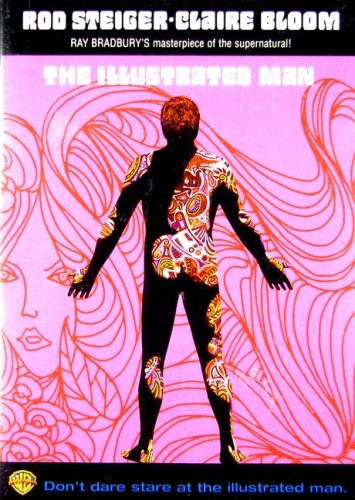
THE ILLUSTRATED MAN
US, 1968, 103 minutes, Colour.
Rod Steiger, Claire Bloom, Robert Drivas, Don Dubbins, Jason Evers.
Directed by Jack Smight.
The Illustrated Man is an interesting, if unsuccessful, science-fiction questioning of man. A rouseabout, covered with skin illustrations., provokes a young man's curiosity by dwelling on his love and hatred for a woman who has illustrated his skin and gone back into the future. Her illustrations remain and come alive. The rouseabout eventually goads the young man to desperate curiosity about his own future. He gazes into the blank part of the illustrated man's back; the result is fear and violence. Each part of the film is interesting, but the whole is hard to follow. Not enough clues are given. It has been suggested that many answers are given, but few questions. Insufficient clues are offered, and the audience is not compelled to follow them up. The Illustrated Man is not really successful and will appeal only to audiences willing to make an effort.
1. Audience interest in science-fiction films? The status for quality for science-fiction films? The quality of this example?
2. The role of science-fiction? Taking the future for understanding the past and the present? The role of fantasy and imagination for interpretation of the world? The illustrations of this film fulfilling this purpose? Centring on an ordinary man, a man becoming a freak for interpretation of time and humanity?
3. How important was the setting of the 30s? The American, away, out of the cities? The importance of widescreen, colour. futuristic sets contrasting with the 30s?
4. The importance of the structure, Willy and his encountering of the stories and Karl's gradual explanation of himself? The interruption to the telling of the stories. and their relationship to Karl and Felicia? Moving towards the empty space on Karl's body? Their menacing goal and fate of death?
5. The impact of Karl's personality? The ordinary rouseabout, his aggressiveness, the illustrations and the impact on him. becoming a freak? The origins of the illustrations, the way that Felicia tricked him. how he allowed himself to be seduced? The meaning of the illustrations? Their quality? The bizarre nature of Karl's presentation of himself, especially when he revealed the illustrations?
6. Willy as the ordinary young man. fascinated by this kind of person, listening. curiosity aroused? His sympathetic listening to Karl? His alarm at his involvement in the stories? The curiosity about the future? His wanting to know, despite the fateful warnings? The audience identifying with his curiosity? The disaster of wanting to know?
7. The mysterious role of Felicia? As a seer, as a seductive woman? As a person, hex leading on of Karl, her wiles in order to tattoo him? The progressive revelation of her character? The nature of her involvement with Karl in each of the stories? The purpose of this? The mysterious woman and her prophetic powers? What did she symbolise?
8. The purpose of the revealing of an electronic world, the electronic story? Karl and Felicia and their role as parents? The ordinary presentation of the children, their ways of enjoyment, in this electronic world? The way that the world moulded them and their choices, their savagery? The sudden death of the parents? The moral of this story within the film? At this stage of the film?
9. The transition to the story of space? Space exploration to people of the 30s? The strange world of rain? The wreck, survival. the interactions of the men, the necessary obeying of orders, disobedience, the sudden deaths? The importance of the suicide. Karl's goal of the sun, light, and Felicia being there? The moral and revelation of this story? At this stage of the film?
10. The last night of the world; the future, the atmosphere of death, once again, husband and wife once again the children? The threat of death, the deceit? Waking up on the morning and the children dead? The moral of this story, at the end of the film?
11. The reason for Willy's fascination, going into the empty space? The impact of seeing his death? The nature of his fear, the reaction of violence and bashing Karl, his fleeing? The menace of Karl's rising, not being dead, beginning his pursuit?
12. The theme of the future, it menace and its eeriness, the fact that it is better that we do not know it?
13. Why were these particular stories chosen for the illustrations? The emphasis on the kinds of world, parents, fantasy, death, children etc.?
14. The reason for making this film? "Each person who tries to see beyond his own time must face questions for which there are no absolute answers."